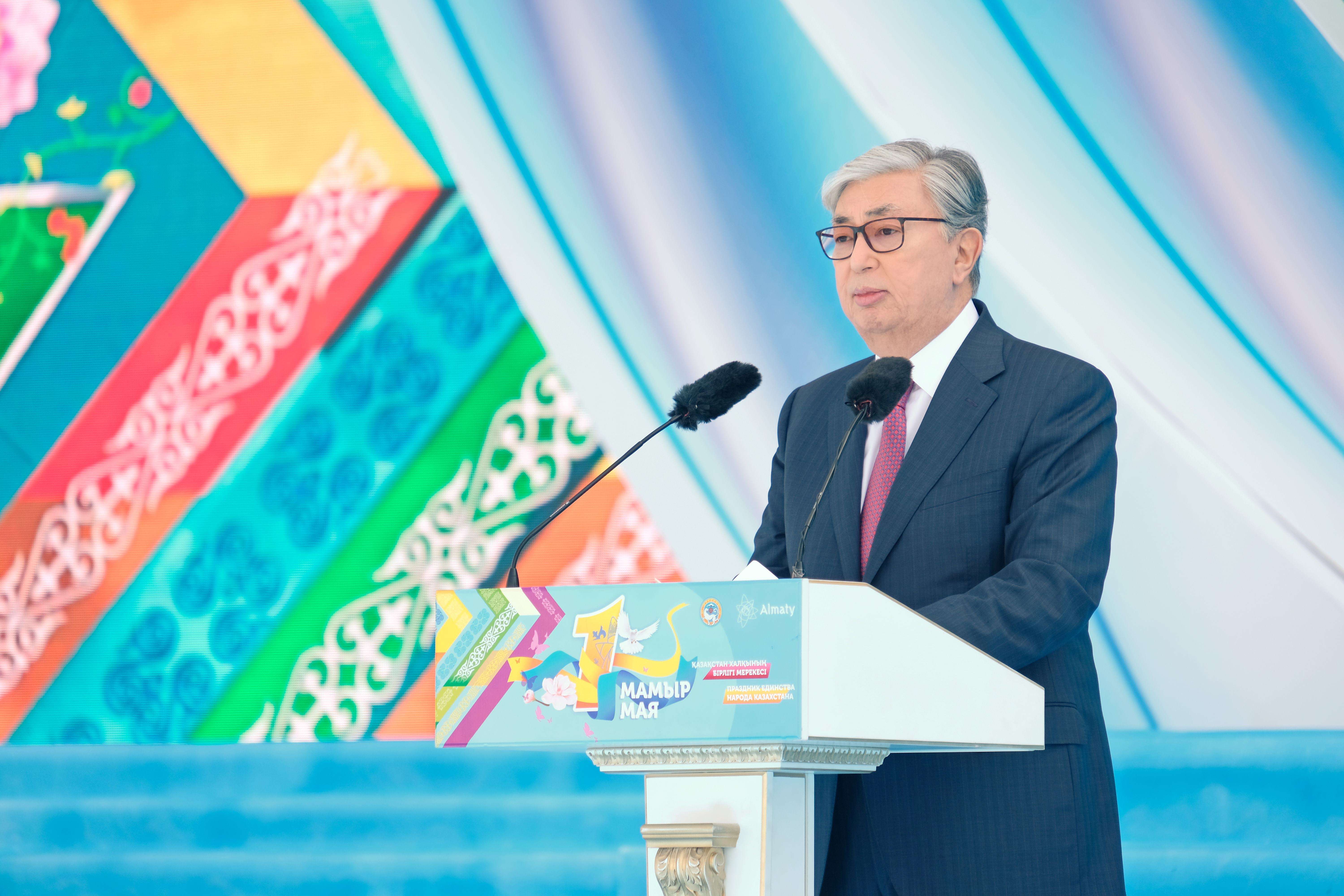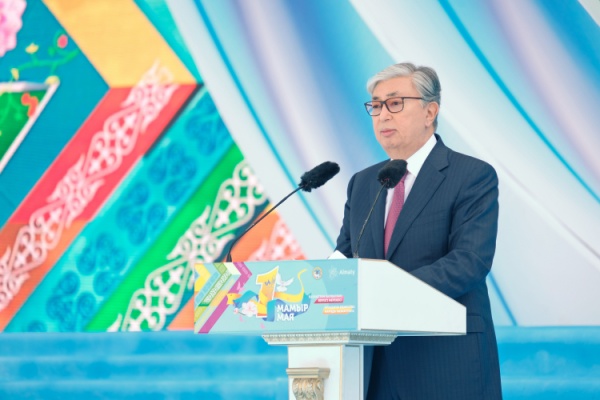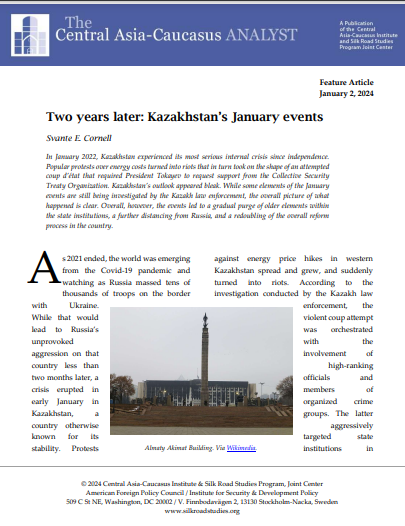Tokayev's Tightrope: Kazakhstan's Balancing Act in a Shifting World
By Anna Harvey
In a January 2025 interview with Ana Tili newspaper, Kazakhstan's President Kassym-Jomart Tokayev outlined his vision of Kazakhstan as a middle power balancing relations between global powers while pursuing domestic reforms. The analysis examines how Tokayev has moved to separate himself from his predecessor, Nursultan Nazarbayev, implementing constitutional changes, economic reforms, and foreign policy shifts following the January 2022 events, while facing the complex challenge of maintaining independence from both Russian and Chinese influence. Tokayev’s leadership marks a new stage of Kazakhstan’s development, positioning the country as an independent player on the global stage.

Photo by Vladimir Tretyakov
BACKGROUND: On January 3, 2025, the President of Kazakhstan Kassym-Jomart Tokayev gave a written interview with Ana Tili newspaper reflecting on 2024 and discussing Kazakhstan’s future. In the interview, Tokayev emphasized Kazakhstan's role as a "middle power" globally; its ties with the U.S., Russia, and China; Nazarbayev's legacy; economic development; and Kazakhstan's future goals. He also addressed the "January events," the January 2022 mass protests against gas prices that turned into an intra-elite fight and escalated into riots and violence.
In international politics, Tokayev expressed pride in Kazakhstan's "middle power" status, stating the country should "work collaboratively to build new, resilient bridges between conflicting geopolitical poles. Kazakhstan maintains support for the UN and other international organizations. Tokayev expressed optimism about relations with both the U.S. and China, noting Kazakhstan's willingness to support Washington regarding Ukraine and plans for extensive high-level dialogue with Beijing in 2025.
Regarding the former president, Tokayev characterized Nazarbayev's legacy as overwhelmingly positive and noted their strong relationship, including monthly phone calls. Despite his own efforts to reduce Russian influence in Kazakhstan, Tokayev expressed no concern about Nazarbayev's December meeting with Putin, describing such meetings as exchanges between "long-time friends and colleagues with much to reminisce about."
On the economic front, Tokayev praised Kazakhstan's progress while noting that "economic growth of 4 percent is insufficient." Rather than artificially holding exchange rates or micromanaging sectors, he stated his belief that the government should "ensure the stability and efficiency of the economy, the dynamic development of the real sector, growth in labor productivity, and the creation of high-quality jobs." He also supports recovering illegally obtained assets for reinvestment in education, infrastructure, and social needs.
Domestically, Tokayev highlighted extensive modernization projects in housing, roadways, railways, industry, and education. He also discussed the expansion of Kazakhstan’s social state: in 2024, the government began the National Fund for Children, where 50% of investment income from the National Fund of Kazakhstan will go to children's savings accounts for housing or education after age 18. Additionally, pensions, academic scholarships, and civil servant salaries were increased. Tokayev also emphasized his government's rapid response to spring 2024 flooding and efforts to build a "Clean Kazakhstan" through environmental initiatives.
In response to a question about the January events, Tokayev affirmed that, had decisive actions “not been taken against the instigators of the riots and organizers of the coup, Kazakhstan today would be a very different country, with diminished independence and restricted sovereignty.” The January events in question began on January 1, 2022, and began as protests against hikes in energy prices in western Kazakhstan. These protests appeared to be co-opted into an intra-elite struggle pitting parts of Nazarbayev’s entourage, specifically in the security structures, against Tokayev’s government, and spiraled into violent riots. Tokayev responded by requesting peacekeeping forces from the Collective Security Treaty Organization (CSTO) be deployed to suppress the rioters. In total, around 238 people were killed. Since the riots, Tokayev has used the memory of the events to support a number of governmental reforms, including strengthening the powers of parliament over the presidency. In his interview, the President encouraged citizens not to fall victim to disinformation related to the riots, and he later stated evidence of involvement from criminal groups in the January events was a driving force behind his efforts to strengthen law and order in Kazakhstan, a project labeled “Just Kazakhstan.”
IMPLICATIONS: Tokayev's interview reveals his continued efforts to establish an independent identity from his predecessor. Initially, Tokayev was depicted as largely a figurehead acting on behalf of Nazarbayev, in spite of clear indications that he was assertively pushing a reformist agenda against the resistance of elements of the “old guard.” Following the January 2022 events, he has made significant breaks from Nazarbayev's legacy through constitutional reforms, including stripping Nazarbayev's title of “Elbasy” (or national patriarch) and removing immunity protections for his family.
Further changes include increasing Kazakhstan’s presence on the world stage and decreasing reliance on Russia. Kazakhstan's “positive balance” policy (initially promoted by Tokayev in 1997, when he was Foreign Minister) has gained new significance, particularly following Russia's invasion of Ukraine. Tokayev’s condemnation of the invasion, acceptance of Russian draft evaders, and pursuit of alternative pipelines have established Kazakhstan as a middle power outside Russia's sphere of influence. Regionally, Kazakhstan has increased its influence through initiatives like the Turkic World Vision-2040 program.
Kazakhstan is Central Asia's largest economy ($261.4M GDP in 2023). Under Tokayev, the country is actively diversifying away from Russian and Chinese influence, especially as a result of Russia’s damaged reputation following the invasion of Ukraine and public skepticism toward Chinese business practices. Seeking alternatives, Kazakhstan has successfully attracted Western investment, particularly from the United States ($65B invested), which sees Kazakhstan as a potential alternate rare-earth supplier and strategic partner in the region.
CONCLUSIONS: President Tokayev has evolved beyond his initial role as Nazarbayev's chosen successor, building a distinct legacy as revealed in his Ana Tili interview. His vision for Kazakhstan's future emphasizes its role as a middle power, balancing engagement with the United States, European Union, Russia, and China to maintain political and economic sovereignty. Under his leadership, Kazakhstan has strengthened its position by expanding regional ties and diversifying its interests beyond Russia and China.
However, significant challenges remain. Kazakhstan must navigate complex domestic power dynamics, including potential resistance from remaining elements of the old guard and public discontent, especially regarding economic opportunities. Meanwhile, Russia continues to pressure Kazakhstan to limit its independent foreign policy, while public skepticism of Chinese influence constrains economic partnerships. The success of economic diversification and domestic reforms will depend on Tokayev's ability to manage these internal and external pressures while maintaining Kazakhstan's sovereignty.
AUTHOR’S BIO: Anna Harvey is a Researcher at the Central Asia and Caucasus Institute and the American Foreign Policy Council. She received a Master of Arts in Russian, East European, and Eurasian Studies from Stanford University. She has written for Newsweek, the U.S. Army War College War Room journal, and Postimees newspaper.
Tokayev's Strategy: Balancing Regional Cooperation and Global Ambitions
By Emma Krdzalic
In the heart of Central Asia, Kazakhstan has been steadily asserting itself as a regional powerhouse. At the sixth consultative meeting of Central Asian leaders in Astana in August 2024, President Kassym-Jomart Tokayev convened with his counterparts from Kyrgyzstan, Tajikistan, Turkmenistan, and Uzbekistan to discuss regional unity and a shared vision for the future. This pivotal gathering, which produced the ambitious “Central Asia – 2040” development concept, was a testament to the groundwork Tokayev laid in his 2023 address on sustainable development and prosperity the previous year. His speech then outlined Kazakhstan’s goals of evolving into a stable middle power by fostering deeper cooperation among Central Asian states, and the 2024 summit reinforced his vision with concrete actions and agreements. By merging strategic foresight with regional collaboration, Tokayev is positioning Kazakhstan as a mediator and a leader capable of navigating Central Asia through modern geopolitical challenges.

BACKGROUND: Kazakhstan’s journey to middle-power status has been driven by several factors, including its rich natural resources, strategic location, and a sensible foreign policy that balances relationships with global powers including Russia, China, Iran, and the West. The country’s role as a key player in the Central Asian region is further cemented by its participation in global organizations such as the United Nations, the Eurasian Economic Union (EAEU), Shanghai Cooperation Organization (SCO), Organization of Islamic Cooperation (OIC), North Atlantic Cooperation Council (NACC), Collective Security Treaty Organization (CSTO), and the Commonwealth of Independent States (CIS). However, Kazakhstan faces significant challenges in its role as a mediator and middle power due to the decline of the liberal international order, which has traditionally supported such nations. The erosion of norms that regulate state behavior has diminished Kazakhstan’s ability to act as a mediator in global conflicts, particularly in an era of heightened tensions between Russia and the West. Additionally, increased cooperation among revisionist powers like Russia, China, and Iran further complicates Kazakhstan’s strategic position, as these nations challenge the liberal international system that Kazakhstan relies on. The ongoing economic tensions between Russia and the West have disrupted key trade routes, forcing Kazakhstan to seek costlier alternatives and exacerbating the challenges of being landlocked. Despite these obstacles, Kazakhstan is adapting by leveraging its geographic advantages, strengthening regional partnerships, and exploring new trade routes that may offer fresh opportunities for influence and collaboration. Internally, President Tokayev has demonstrated a keen understanding of Kazakhstan’s challenges, particularly in maintaining political stability and responding to public demands for reform. The events of early 2022, when an attempted coup exposed rifts within the elite, highlighted the need for Tokayev to consolidate power and initiate meaningful reforms. While some steps have been taken to address these challenges, such as regaining control over state institutions and exploring new regional partnerships, the government faces a delicate balancing act. It must navigate the competing interests of various elite groups, respond to public demands for change, and maintain its strategic position in a shifting global landscape. The success of Kazakhstan’s “New Kazakhstan” initiative will largely depend on its ability to implement genuine reforms while maintaining stability and leveraging its geographic advantages in an increasingly complex international environment. While Tokayev has succeeded in regaining control over state institutions, the underlying tensions within the political elite remain, posing long-term challenges to the country’s stability.
IMPLICATIONS: To address these challenges, Tokayev has prioritized reforms aimed at improving governance, expanding human capital development, and enhancing the country’s competitiveness on the global stage. A key aspect of these reforms is Tokayev’s focus on education and culture. Kazakhstan has actively expanded its partnerships with top universities and invited Central Asian youth to study in the country, recognizing the importance of education in fostering innovation and economic growth. This strategy not only builds a more skilled workforce but also strengthens Kazakhstan’s regional influence by creating educational ties with neighboring countries. Pouring resources and effort into this cause, if done well, will ultimately give Kazakhstan long-term solutions and results that not only support the current state of the country but also build an overall more educated population that fosters stability and cooperation within the region. Additionally, Tokayev has called for greater cooperation in information and analytics, suggesting the creation of joint media products and even a pan-regional TV channel or internet news portal. This initiative is part of a broader effort to enhance Kazakhstan's soft power in the region and promote cultural and humanitarian cooperation. By investing in these areas, Tokayev aims to build a more cohesive regional identity while showcasing Kazakhstan as a model for development and modernization. On August 9th, President Tokayev underlined Kazakhstan’s strategic course for strengthening regional partnerships and increasing the role of Central Asia on the global scale at the sixth consultative meeting of Central Asian heads of state. This showed that Kazakhstan, as a middle power, has a unique role in shaping the future of Central Asia. Its geographic location as a bridge between the Caspian Sea and China, coupled with its economic interests across the region, positions Kazakhstan as a key player in the East-West corridor. However, Kazakhstan’s success as a middle power will depend not only on its ability to manage relationships with great powers but also on its cooperation with other regional states. Tokayev proved himself to be making consistent and conscious efforts to promote these ideals in this meeting through his speech, which supported models and roadmaps for continuous cooperation in a variety of sectors for Central Asia. Additionally, Tokayev’s advancements in cooperation with states like Uzbekistan and Azerbaijan support his claim to commit to regional cooperation that would stabilize the Central Asian region. The partnerships with Uzbekistan and Azerbaijan, both of which are emerging as aspiring middle powers, are crucial for the stability and development of Greater Central Asia. These partnerships facilitate trade, security cooperation, and regional integration, while also counterbalancing the influence of larger powers like Russia and China. At the same time, Kazakhstan’s role in stabilizing smaller states in the region, such as Kyrgyzstan and Tajikistan, is essential for maintaining peace and security in Central Asia. Tokayev’s efforts to reinforce Kazakhstan’s influence are evident in his focus on strengthening regional alliances, particularly with Uzbekistan. Recent visits to Astana by Uzbek President Shavkat Mirziyoyev have marked a new era of cooperation between the two countries, leading to strategic partnerships in the trade, transport, energy, and agriculture sectors. The leaders signed key documents, including the 2040 Concept for Regional Development and a roadmap for industrial cooperation, deepening economic and cultural ties. With nearly 70 joint projects valued at over US$ 3 billion and employing 14,000 people, the partnership aims to enhance connectivity and create new trade corridors. Additionally, agreements on water resource management and cultural cooperation for 2024-2025 further highlight the countries’ commitment to regional sustainability and shared values.
CONCLUSIONS: Kazakhstan’s rise as a middle power is a complex balancing act that requires both internal reforms and strategic external partnerships. In his August speech, President Tokayev outlined a clear vision for Kazakhstan’s future, emphasizing sustainable development as a pathway to long-term prosperity. The country’s middle-power status depends on its ability to navigate geopolitical challenges while fostering strong regional alliances, particularly with Uzbekistan, and ensuring internal stability through meaningful reforms. President Tokayev’s response to Kazakhstan’s rise as a middle power reflects a forward-looking strategy emphasizing regional cooperation, domestic reforms, and global engagement. By expanding educational and cultural ties, enhancing cooperation in information and analytics, and strengthening alliances with neighboring countries, Tokayev is positioning Kazakhstan as a key player in the future of Central Asia. However, the challenges posed by geopolitical tensions, economic disruptions, and internal political dynamics remain significant. Tokayev’s ability to navigate these challenges will determine whether Kazakhstan can sustain its middle-power status and continue to play a stabilizing role in the region. Tokayev’s efforts as Kazakhstan moves forward to maintain its middle-power role have not gone unnoticed as Kazakhstan confirms and fortifies its partnerships with countries like Uzbekistan and Azerbaijan, as well as its engagement with Central Asia and the broader international community. The path it remains on will be key to its success in shaping the future of Central Asia and beyond.
AUTHOR’S BIO: Emma Krdzalic is a current intern at the American Foreign Policy Council (AFPC), where she researches National Security dynamics, Russia, Russia-Ukraine, Central Asia, and the Caucasus. She is a student at the University of Georgia, pursuing her studies in International Relations, Political Science, and Russian while interning in Washington, D.C. through the Washington Semester Program.
Kazakhstan Resurrects Golden Horde in Political Messaging
By Dmitry Shlapentokh
April 24, 2024
Recently, Kazakhstan’s President Kassym-Jomart Tokayev delivered a public address wherein he underscored the significance of the Golden Horde, also known as Ulus Jochi, to Kazakhstan. He emphasized that Kazakhstan stands as the true descendant of the Golden Horde, equating its historical importance to that of the Roman Empire. Tokayev emphasized the importance of ensuring international recognition of this fact. Additionally, he announced the commissioning of a comprehensive multi-volume history of Kazakhstan, with a dedicated volume specifically focusing on Ulus Jochi and its pivotal role in shaping Kazakhstan’s history. Tokayev’s recent revival of this ideology suggests that Kazakhstan, in stark contrast to Russia and implicitly other post-Soviet states, espouses principles of tolerance and peaceful coexistence.
Two Years Later: Kazakhstan's January Events
By Svante E. Cornell
January 2, 2024
In January 2022, Kazakhstan experienced its most serious internal crisis since independence. Popular protests over energy costs turned into riots that in turn took on the shape of an attempted coup d’état that required President Tokayev to request support from the Collective Security Treaty Organization. Kazakhstan’s outlook appeared bleak. While some elements of the January events are still being investigated by the Kazakh law enforcement, the overall picture of what happened is clear. Overall, however, the events led to a gradual purge of older elements within the state institutions, a further distancing from Russia, and a redoubling of the overall reform process in the country.
Four Years On: An Update on Kazakhstan’s Reforms
Svante E. Cornell
October 24, 2023
Almost four years have passed since President Kassym-Jomart Tokayev embarked upon an agenda to bring thorough reforms to Kazakhstan’s politics and society. This article looks at the process of implementation of these reforms in a highly precarious geopolitical environment, where Russia’s war in Ukraine has led to increasing threats to Kazakhstan’s integrity by leading Russian figures. This analysis shows that Kazakhstan has proceeded on institutional reform, including modest but meaningful steps in sensitive areas such as separation of powers and electoral systems.




